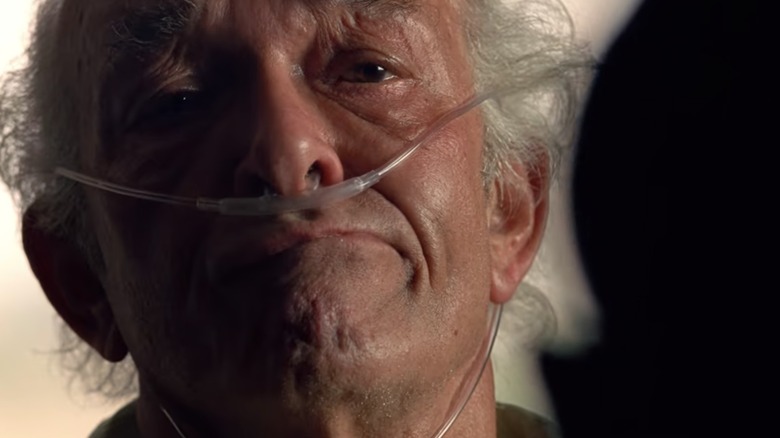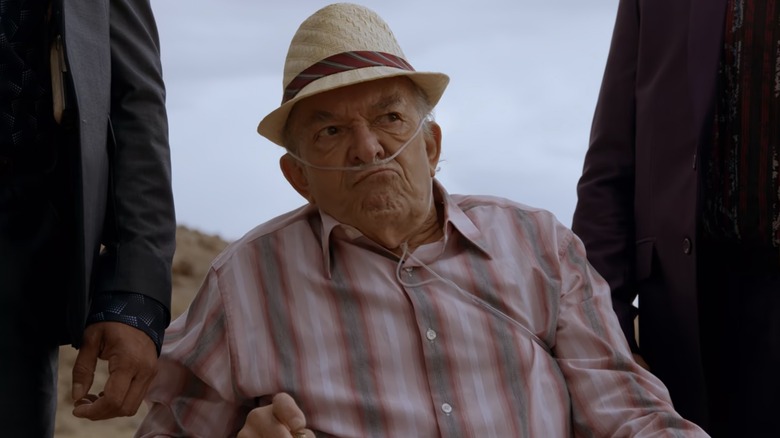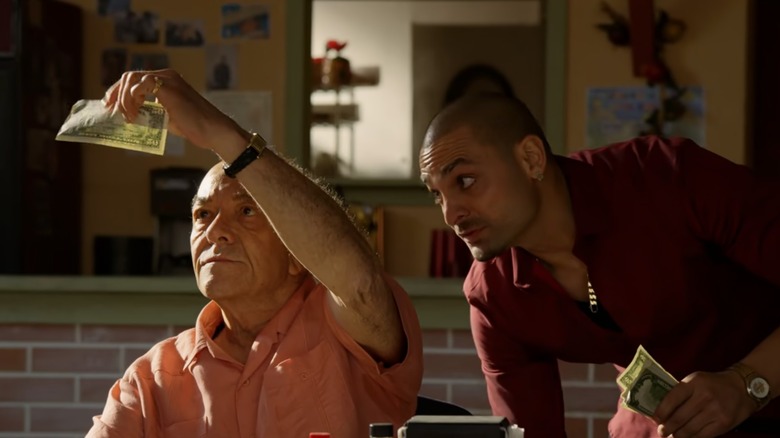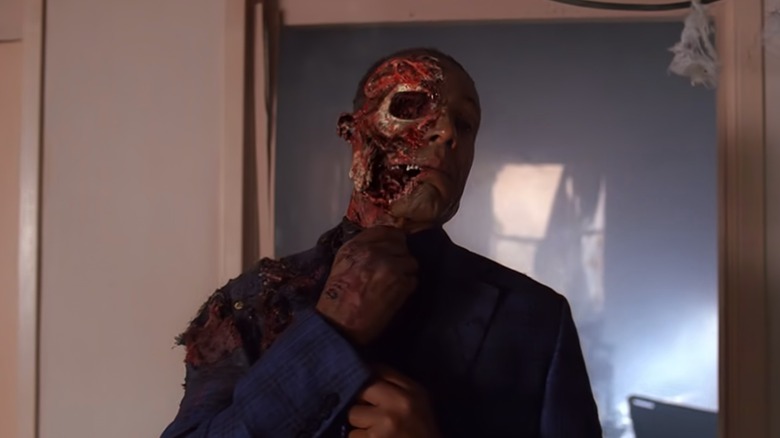Mark Margolis' Breaking Bad Emmy Nod Proved A Great Performance Just Needed A Little Bell
Esteemed character actor Mark Margolis passed away this week at the age of 83, leaving behind a long legacy of memorable film and TV characters. Though while you might remember him from "Scarface," "Oz," or "The Wrestler," it's more likely Margolis' face calls to mind one singularly unforgettable role: Hector Salamanca, the ruthless leader of the Salamanca crime family in the "Breaking Bad" universe.
As Hector, Margolis spent most of his time in a wheelchair with an oxygen cannula in his nose, the character communicating only via a small metal bell like the kind you'd find at a hotel front desk. Despite the fact that his performance was largely non-verbal, communicated through flared nostrils and angry, chiming taps, Margolis actually earned an Emmy nod for his turn as the character in 2012. The performer eventually lost the race for Outstanding Guest Actor in a Drama Series to "Justified" actor Jeremy Davies, but his nomination alone was a testament to a powerhouse performance — and a complex portrayal of disability on screen.
Margolis was one of the most memorable parts of Breaking Bad
Despite the "guest star" moniker, Margolis actually appeared as Hector Salamanca in a combined 30 episodes of "Breaking Bad" and "Better Call Saul," and ultimately became one of the most harrowing figures in the endlessly intense crime saga. The Cousins, the silent, terrifying twin assassins played by Daniel and Luis Moncada, looked to him for advice and guidance, respecting him as both their boss and their uncle. Gus Fring (Giancarlo Esposito), widely considered the series' most imposing villain, often had a healthy fear of Hector, and was ultimately taken down by him in "Face Off," the season 4 finale of "Breaking Bad" for which Margolis earned his Emmy nod.
"Breaking Bad" made a point of showing the ways in which Hector struggled to embrace his life as a non-verbal wheelchair user in the wake of a stroke, as he's moved to a nursing home, has to be carried through inaccessible spaces, and is often ignored no matter how insistent his chimes may be. Yet the show also gave the character a tremendous amount of power and authority, and he used the way others underestimated him as an opportunity to make major moves. He's a nasty, lifelong killer who seems to think his only weapon now is his own body, whether he's soiling himself to make a point to the DEA or spelling out curse words with his bell. When he takes down Gus Fring, it's via a bomb connected to his wheelchair, one that he detonates with a series of taps. Gus always taunted Hector about his inability or unwillingness to look the man in the eye, but in his final moments, Hector does.
Hector Salamanca's disability was central to his character
While "Better Call Saul" viewers are given plenty more context for this showdown, at the time it feels like a righteous "f*** you" to Gus, not just for his undermining, violent actions against the cartel, but also for his years of demeaning, ableist disrespect. Of course, the show's take on disability wasn't without its faults. As Sharif Bitar writes in an academic work titled "The Representation of Disability in Contemporary American Television Series," the show portrays disability as emasculating, and "disability emerges as an antagonistic force that must be dealt with once and for all in both Hector's and Hank's highly goal-oriented, masculine character arcs."
As a non-wheelchair user, I can't speak to how thoroughly, realistically, or appropriately the show's writers tackled his disability storyline, but I know Margolis was always the most fearsome, captivating presence on screen whenever he arrived. The official "Breaking Bad" Twitter account summarized the strong impression he made well in a post about Margolis' passing, saying:
We join millions of fans in mourning the passing of the immensely talented Mark Margolis, who – with his eyes, a bell, and very few words – turned Hector Salamanca into one of the most unforgettable characters in the history of television. He will be missed.
No one wants a face off against Hector
Hector was a complex character, and Margolis brought countless shades of gray to his performance as a character who initially seemed to be just a bitter, merciless old man. In "Better Call Saul," viewers learn that Hector used to enjoy his position as head of the crime family, but it was cut short when Nacho (Michael Mando) induced his stroke, attempting to stop him from involving Nacho's father in his dangerous enterprises. We also see that Hector killed Gus' partner and that pointless act of violence is what launched the pair into a years-long face-off that ended with — appropriately — the indelible events of the episode "Face Off."
Margolis' turn as Hector "Tio" Salamanca was as memorable as any performance in the world of "Breaking Bad." He conveyed rage and pain and suspicion through facial expressions alone, grimacing his way through some of the show's most tense moments. He managed to tell a complete story via the most minute of movements and struck fear into the hearts of viewers and characters alike — usually without saying a word. Margolis may have only ever been recognized as a guest star on "Breaking Bad," but he was integral to the show's world, and he will be greatly missed.



